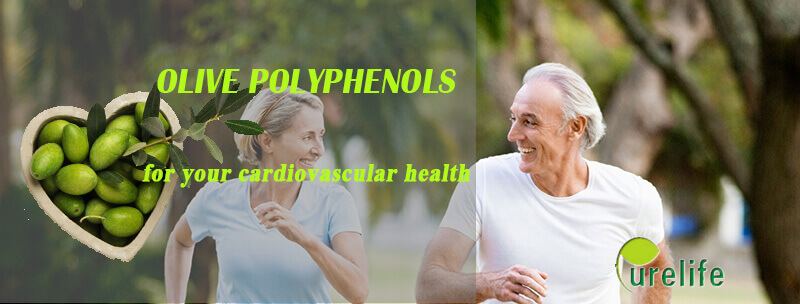Olive polyphenols are good for cardiovascular health
What is polyphenols?

Polyphenols are natural bioactive compounds, naturally present in fruit, vegetables and other plants, which are known by their anti-oxidant and anti-inflammatory capacity. Consuming polyphenols is important in slowing the process of aging and in preventing cardiovascular disease, cancers, dementia and other diseases of modern society. Olive is one of fruit that is rich in Polyphenols, and currently, clinical trials have proved that olive extract polyphenols are good for cardiovascular health
Olive polyphenols are good for cardiovascular health
A European study found that polyphenols in olive oil can reduce LDL (Low density lipoprotein) cholesterol levels in healthy young people, and increase arterial wall LDL. The study also showed that young male volunteers decreased 12% of the total LDL after consuming olive oil rich in polyphenols, while the LDL was increased by 5% on the subjects who took olive oil with low polyphenols
Polyphenol-rich olive oil is inextricably linked to the reduction of LDL atherosclerosis, which can be measured by the reduction of small LDL particles and the enhancement of LDL antioxidant capacity. Current experiments have confirmed that taking olive oil polyphenols for a period of 3 months can reduce LDL concentrations and the risk of LDL atherosclerosis in the body, and also significantly reduces the content of total LDL particles
In this randomized cross-control trial, participants aged between 20 and 59 were randomly assigned to two groups, and each group respectively consumed 25mL of low-phenol and high-phenol olive oil for a period of 3 weeks (The polyphenols content of the two olive oils were 2.7 mg/kg and 366 mg/kg )
The results showed that the LDL concentration was decreased significantly in the high polyphenols group. In addition, atherosclerosis in high polyphenols decreased significantly, and LDL oxidation delay increased by 5%. LDL is associated with early atherosclerosis and high cardiovascular risk. According to data, the number of small LDL particles decreased by 15.3 % after taking olive oil polyphenols.
The researchers evaluated the expression of the gene that produces lipoprotein lipase (LPL) and concluded that after consuming olive oil with high levels of polyphenols, gene expression increased by 26% compared with the standard value, but no changes were observed in the low polyphenols olive oil group. Increase LPL genes expression can reduce lipoprotein (eg LDL) concentrations, because LPL is the main enzyme that eliminates triglycerides in blood vessels and maintains LDL receptor activity. Furthermore, the potential antioxidant activity of polyphenols in olive oil may also affect the test results, reduce LDL oxidation, and reduce the risk of atherosclerotic plaque formation.
In a word, consumption of olive polyphenols reduces LDL concentrations, the results can be measured by the level of apolipoprotein B-100 and the number of total LDL particles. The acquisition of polyphenols also reduces LDL atherosclerosis, which can be reflected in the decrease in the number of small LDL particles and the increase in LDL antioxidant capacity.
Where to buy bulk olive polyphenols ?
Purelife bio supplies olive extract polyphenols powder with kinds of specs/contents, if you have any inquiry, welcome to contact us any time.


